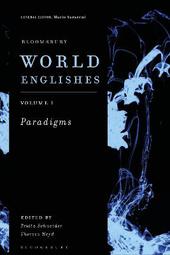
|
Bloomsbury World Englishes Volume 1: Paradigms
Hardback
Main Details
| Title |
Bloomsbury World Englishes Volume 1: Paradigms
|
| Authors and Contributors |
Edited by Dr Britta Schneider
|
|
Edited by Dr Theresa Heyd
|
|
Edited by Mario Saraceni
|
| Physical Properties |
| Format:Hardback | | Pages:320 | | Dimensions(mm): Height 244,Width 169 |
|
| Category/Genre | Sociolinguistics |
|---|
| ISBN/Barcode |
9781350065802
|
| Classifications | Dewey:427 |
|---|
| Audience | | Tertiary Education (US: College) | |
|---|
|
Publishing Details |
| Publisher |
Bloomsbury Publishing PLC
|
| Imprint |
Bloomsbury Academic
|
| Publication Date |
17 June 2021 |
| Publication Country |
United Kingdom
|
Description
Bloomsbury World Englishes offers a comprehensive and rigorous description of the facts, implications and contentious issues regarding the forms and functions of English in the world. International experts cover a diverse range of varieties and topics, offering a more accurate understanding of English across the globe and the various social contexts in which it plays a significant role. With volumes dedicated to research paradigms, language ideologies and pedagogies, the collection pushes the boundaries of the field to go beyond traditional descriptive paradigms and contribute to moving research agendas forward. Volume 1: Paradigms analyzes the ways in which we make sense of English as a global language, its many varieties and how these come into contact and interact with other languages. It moves the field beyond existing 'models' that are no longer sufficient to describe English(es) in the era of globalization.
Author Biography
Britta Schneider is Junior Professor of Language Use and Migration at Europa-Universitat Viadrina, Germany. Theresa Heyd is Chair of English Linguistics at Universitat Greifswald, Germany. General Editor: Mario Saraceni
ReviewsBloomsbury World Englishes provides a modern variationist approach to research in Englishes that shifts from traditional descriptive research on formal nation state varieties and recognizes the breadth of variation within any community of speech. It celebrates variation and offers a more accurate understanding of these ever-changing languages that serves distinct and overlapping communities. * Elizabeth Winkler, Professor of Linguistics, Western Kentucky University, USA *
|